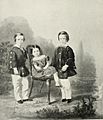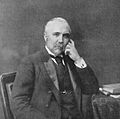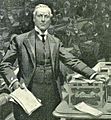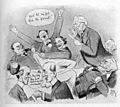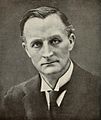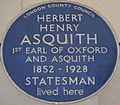Herbert Asquith facts for kids
Quick facts for kids
The Earl of Oxford and Asquith
|
|
|---|---|
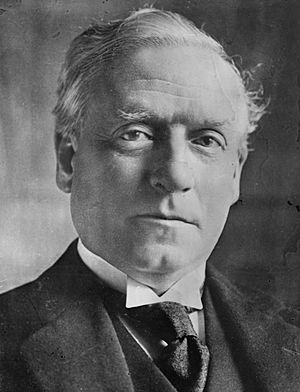 |
|
| Prime Minister of the United Kingdom | |
| In office April 5, 1908 – December 5, 1916 |
|
| Preceded by | Sir Henry Campbell-Bannerman |
| Succeeded by | David Lloyd George |
| Chancellor of the Exchequer | |
| In office 10 December 1905 – 12 April 1908 |
|
| Preceded by | Austen Chamberlain |
| Succeeded by | David Lloyd George |
| Personal details | |
| Born | 12 September 1852 Morley, Yorkshire, England |
| Died | 15 February 1928 (aged 75) Sutton Courtenay, Oxfordshire, England |
| Political party | Liberal |
Herbert Henry Asquith (born September 12, 1852 – died February 15, 1928) was an important British politician. He was a member of the Liberal Party. Asquith served as the Prime Minister of the United Kingdom from 1908 to 1916. He was one of the longest-serving Prime Ministers in the 20th century.
During his time as Prime Minister, Asquith introduced many important changes. These included new laws about social support for people. He also reduced the power of the House of Lords, which is part of the British Parliament. Asquith led Britain into the First World War. However, he was replaced by David Lloyd George in late 1916. His disagreements with Lloyd George played a big part in the Liberal Party losing its power.
Asquith's time as Prime Minister brought in several key laws. These included the Old Age Pension in 1908, which helped older people. The National Insurance Act of 1911 provided social insurance. The Parliamentary Act of 1911 limited the power of the House of Lords.
Some of Asquith's famous descendants include the ambassador Dominic Asquith. The actress Helena Bonham Carter is his great-granddaughter. The actress Anna Chancellor is his great-great-granddaughter.
Contents
Who Was H.H. Asquith?
Herbert Henry Asquith was born in Morley, Yorkshire, England. He became a lawyer before entering politics. He was known for being very smart and a good speaker. Asquith joined the Liberal Party. This party believed in social reform and individual freedoms.
Early Political Career
Asquith first became a Member of Parliament (MP) in 1886. He quickly became a rising star in the Liberal Party. Before becoming Prime Minister, he held another very important job. He was the Chancellor of the Exchequer from 1905 to 1908. This role is like being the country's chief financial officer. He managed the government's money and taxes.
Becoming Prime Minister
Asquith became Prime Minister in April 1908. He took over from Sir Henry Campbell-Bannerman. As Prime Minister, Asquith faced many challenges. He led a government that wanted to make life better for ordinary people.
Important Laws and Changes
Asquith's government passed several major laws. These laws changed British society a lot.
- Old Age Pension (1908): This law gave a small weekly payment to people over 70. It was one of the first times the government helped older people financially.
- National Insurance Act (1911): This law helped workers who were sick or unemployed. It was an early form of social insurance. It meant people had some money if they couldn't work.
- Parliament Act (1911): This law changed the power balance in Parliament. It reduced the power of the House of Lords. Before this, the House of Lords could block laws passed by the elected House of Commons. After this act, they could only delay them.
Asquith's government also faced challenges regarding women's right to vote. He was not in favor of giving women the right to vote at that time. Many women, called suffragettes, campaigned strongly for this right.
Leading During World War I
In 1914, the First World War began. Asquith was the Prime Minister when Britain entered the war. This was a very difficult time for the country. The war brought many new problems for the government to solve.
War Challenges and Leadership Change
As the war continued, there were many military and political problems. People started to question Asquith's leadership. In December 1916, he was replaced as Prime Minister by David Lloyd George. Lloyd George was a strong leader who took a more active role in the war effort.
Asquith continued to be an important figure in politics. However, his disagreements with Lloyd George caused problems for the Liberal Party. This eventually led to the party losing much of its power.
Family and Legacy
Asquith died in 1928. He is remembered for his important reforms before World War I. He helped create the beginnings of Britain's social welfare system. His work laid the groundwork for future social support programs.
Images for kids
-
Campbell-Bannerman, Liberal leader from 1899
-
Asquith as Chancellor of the Exchequer, in the House of Commons
-
The British Empire in 1910
-
Asquith visits the front during the Battle of the Somme, 1916
-
Memorial to Asquith, Westminster Abbey
-
Blue plaque, 20 Cavendish Square, London
See also
 In Spanish: Herbert Henry Asquith para niños
In Spanish: Herbert Henry Asquith para niños
 | Charles R. Drew |
 | Benjamin Banneker |
 | Jane C. Wright |
 | Roger Arliner Young |



